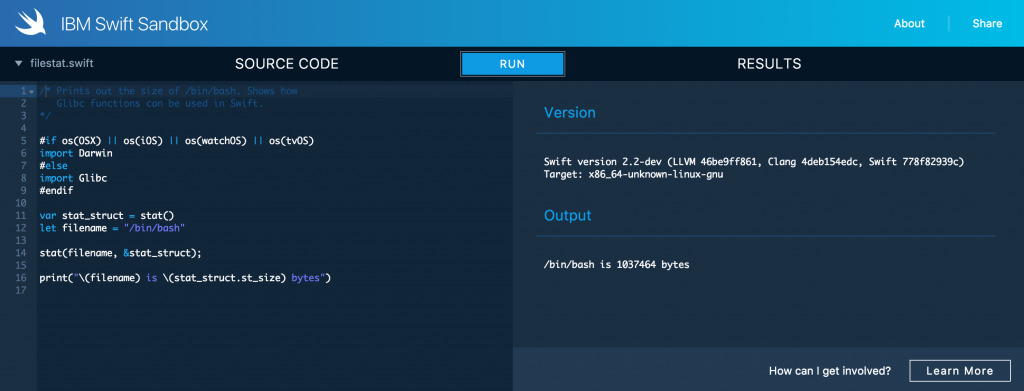Just hours after Apple made its Swift programming language open source, IBM has introduced a new, simple, and free browser-based way for developers to get started writing code.
Created at IBM's Mobile Innovation Lab in Austin, the new IBM Swift Sandbox tool is now available to test in beta form on the developerWorks website. Swift Sandbox allows developers to write Swift code and execute it in a server environment on top of Linux.
John Petitto, an IBM Swift developer, detailed the new tool on Friday in a post to Big Blue's developer website. The sandbox runs on IBM Cloud in a Docker container, and allows testers to use both the latest versions of Swift and its standard library.
Petitto teased that Swift Sandbox is just the beginning from IBM, which has openly embraced Apple's programming language for iOS and OS X. Now that it's open source, Petitto said that the Swift Sandbox tool "barely scratches the surface of what's possible."
In an interview this week, Apple senior Software VP Craig Federighi revealed that IBM has been a "major source" of feedback on Swift. The Armonk, New York-based company has an ongoing partnership to develop enterprise-focused mobile apps on iOS via Swift.
 Neil Hughes
Neil Hughes








 William Gallagher
William Gallagher
 Malcolm Owen
Malcolm Owen


 Andrew O'Hara
Andrew O'Hara
 Andrew Orr
Andrew Orr




-m.jpg)






27 Comments
Wow. I'm not a developer (yet), but this would seemingly portend a potentially huge end run around the corporate Windoze hegemony.
I don't know that it does that completely - There's no reason Swift won't become available for Windows, because it is open source, after all. Yes, it could help break the dominance of Windows-only applications (although that's been fading on its own for quite some time) but it probably doesn't leave Windows out in the cold. Not a developer yet? Definitely use that IBM link. Seeing the code on one side of the screen and the results on the other is one of the best ways to begin.
This is very cool. It even supports Apple's foundation framework. The browser interface is very responsive. This allows any platform with a web browser to try out Swift.
I always wondered if IBM had an interest in Swift in part because of Java/Oracle: http://stackoverflow.com/questions/3824372/where-can-i-find-a-particular-version-of-the-ibm-jdk-jre-for-windows http://www.ibm.com/developerworks/forums/thread.jspa?messageID=14514070 "Unfortunately you can get hold of the JDK only as part of another IBM product (say, Websphere or any Rational product) that you purchased. Our licensing agreement with Sun/Oracle forbids us from providing direct downloads of the IBM JDK on any platforms that Oracle/Sun also support (namely Windows and Linux). If you look at the Java downloads section of the developerWorks website, you'll only find SDKs for AIX, z/OS and Linux on System p/z, since those are IBM owned platforms that Oracle doesn't support." Swift running server-side allows for a replacement for Java and for some businesses replacing Java can cut some costs out: http://www.oracle.com/us/corporate/pricing/price-lists/java-embedded-price-list-1977272.pdf Java is used to develop Android apps too. It would be good to see adoption of Swift in the game SDKs (Unreal, Unity) at least. Having it able to run server-side means an app developer would only need to know one language to make cloud apps. Games have been made where heavy processing parts run on a server: http://www.developer-tech.com/news/2015/aug/05/gamescom-microsoft-demonstrates-power-its-cloud/ https://www.youtube.com/watch?v=MJfEUJ57qD8 http://www.extremetech.com/gaming/215532-microsoft-buys-havok-physics-from-intel-could-boost-xbox-one-cloud-gaming As long as the connection is stable, a Swift app can send off a calculation to a server that runs up a number of instances in the same Swift code hundreds of times faster than the device could do on its own and just send back the results.